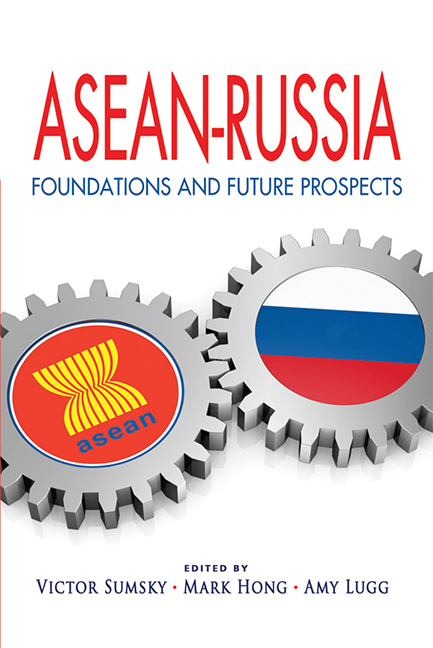Book contents
- Frontmatter
- Contents
- Foreword
- Preface
- About the Contributors
- Keynote Address
- Opening Remarks
- Keynote Address
- Introduction: Russia and the ASEAN Member States: Political and Economic Cooperation in Progress
- SECTION I WISEMEN'S VIEWS
- SECTION II GEOPOLITICS
- SECTION III BILATERAL RELATIONS
- SECTION IV Business and Economics
- SECTION V CULTURE AND EDUCATION
- EPILOGUE
- Index
Foreword
Published online by Cambridge University Press: 21 October 2015
- Frontmatter
- Contents
- Foreword
- Preface
- About the Contributors
- Keynote Address
- Opening Remarks
- Keynote Address
- Introduction: Russia and the ASEAN Member States: Political and Economic Cooperation in Progress
- SECTION I WISEMEN'S VIEWS
- SECTION II GEOPOLITICS
- SECTION III BILATERAL RELATIONS
- SECTION IV Business and Economics
- SECTION V CULTURE AND EDUCATION
- EPILOGUE
- Index
Summary
This volume is the third in the series of ASEAN-Russia relations books published by the Institute of Southeast Asian Studies (ISEAS) and its counterpart Russian institute, formerly with IMEMO and now with MGIMO. We warmly welcome our new Russian partner, with which we organized the third ASEAN-Russia Conference in April 2011. These conferences are particularly useful as Track Two diplomacy efforts to examine the state of relations between both sides, and to share some ideas on how to advance cooperation between ASEAN and Russia. This year's conference was useful as it precedes Russia's Chairmanship of APEC in 2012, and as Russia is searching for new ways to add value and substance to its recent membership of the East Asia Summit (EAS) and the Asia-Europe meeting (ASEM).
This year's conference witnessed some stimulating discussions. One of the highlights was an animated discussion on Russian soft power. Another major point of discussion was how to ascertain Russia's value-adding capability for ASEAN, and vice versa. The presentation of the paper on a roadmap on Russia-ASEAN economic cooperation was especially relevant in this context. Also highly relevant were the discussions on the possible Russia-ASEAN FTA; Trans-Pacific Partnership, including possible Russian participation; and energy cooperation. In the area of geopolitics, there were excellent discussions on Russia-China relations, and how this will impact upon Asia-Pacific regional security. One example was the paper on maritime logistics, an area seldom examined. In the area of educational cooperation, the National University of Singapore paper evoked high interest from the Russian education representatives present, namely, MGIMO, Moscow State University and the Russkiy Mir Foundation. In the area of cultural cooperation, there were diverse and interesting presentations about cooperation on paintings, food, translations of books, and the publication of a bilingual magazine. Many of the topics mentioned above are covered in the papers published in this book.
Lastly, I wish to commend the paper-writers and the co-editors for their hard work and interesting ideas, which have made this volume an illuminating and distinguished book, and a very useful reference for students and scholars of ASEAN-Russia relations.
- Type
- Chapter
- Information
- ASEAN-RussiaFoundations and Future Prospects, pp. ix - xPublisher: ISEAS–Yusof Ishak InstitutePrint publication year: 2012



